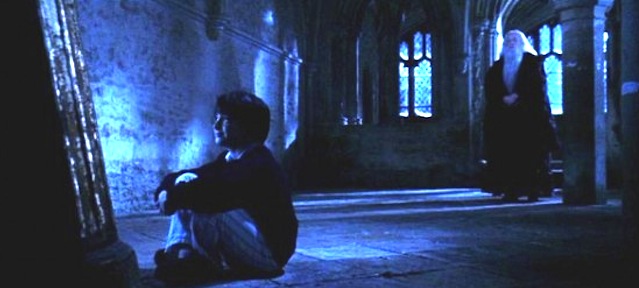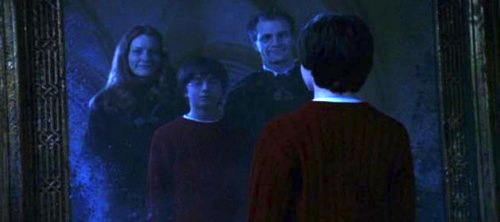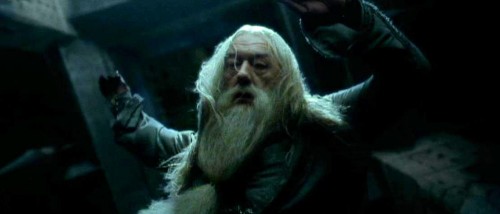
Wands at the ready! We bring you the second installment of our series exploring some of the theological elements in the Harry Potter saga. You can find part one here.
And slowly, Harry looked into the faces of the other people in the mirror, and saw other pairs of green eyes like his, other noses like his…Harry was looking at his family, for the first time in his life…He had a powerful kind of ache inside him, half joy, half terrible sadness. How long he stood there, he didn’t know. The reflections did not fade and he looked and looked…
It is no coincidence that ‘Erised’ backwards spells ‘Desire,” the basis of the magical mirror’s enchantment. In the first book Harry, in his nighttime wanderings of Hogwarts School, stumbles upon a room completely empty and unused save for this enormous mirror, which startles him due to what he sees in its reflection. Rather than seeing just the room behind him, Harry glimpses his parents and family, those he’d never known and always longed to know. Entranced, he takes Ron the next night to show him his parents. Ron does not see Harry’s parents, though; he sees himself, older, good-looking, and successful.
Ron, though, was staring transfixed at his image. “Look at me!” he said. “No—I’m alone—but I’m different—I look older—and I’m head boy!”
“What?”
“I am—I’m wearing the badge like Bill used to—and I’m holding the house cup and the Quidditch cup—I’m Quidditch captain too!”
Ron tore his eyes from this splendid sight to look excitedly at Harry. “Do you think this mirror shows the future?”
“How can it? All my family are dead—let me have another look—”
Despite Ron’s concern for Harry’s fixation with the mirror, Harry goes back a third time on the third night, only to find that he’s not in the room alone this time. Dumbledore, understanding his fascination with the Mirror of Erised, explains its function:
“It shows us nothing more or less than the deepest, most desperate desires of our hearts…However this mirror will give us neither knowledge nor truth. Men have wasted away before it, entranced by what they have seen, or been driven mad, not knowing if what it shows is real or even possible.”
The mirror, in fact, does what all mirrors do, albeit on a deepest level: the Mirror of Erised reflects the heart’s desire. In the same way that an average mirror reflects to the viewer a self which is constrained to its external appearance, this magical mirror makes manifest those invisible deities which lie below the surface. In short, it betrays those idols upon which we’d hang our hat every time.
[youtube=http://www.youtube.com/watch?v=F_plSfDNPKI&w=550]
Rowling here is championing an exceedingly low anthropology—no one wants to accept things as they are, and our yearning “if only’s” often arrest our ability to live our lives. Harry and Ron are drawn into their custom-made fantasy worlds: self-induced denials of the truth of their greatest fears, be it dead parents or an unloved, overshadowed sibling. The Mirror does not for anyone reveal a pure desire to live for others, to love compassionately, to seek truth. It simply shows the self-oriented desires of the heart. Moreover, rather than the mirror standing as some Herculean temptation to courageous and pure-hearted soldiers, this mirror conveys, as Dumbledore explains to Harry, what lies precisely within (and not without) ourselves.
As Dumbledore hints to Harry, only a truly happy man could look into the Mirror of Erised and see himself as he is. The Mirror of Erised is powerless over a person who has confronted himself or herself as they are, and accepted that person. Rowling, via Dumbledore, is saying that self-love comes through self-knowledge. One cannot deny one’s true nature and be happy. Is this possible? It seems that if it could be, Dumbledore would be its beholder. Yet, in the Deathly Hallows, Harry discovers that Dumbledore, too, could not escape his own desire for power:
“I had proven, as a very young man, that power was my weakness and my temptation. It is a curious thing, Harry, but perhaps those who are best suited to power are those who have never sought it. Those who, like you, have leadership thrust upon them, and take up the mantle because they must, and find to their surprise that they wear it well.”
…At last he knew what Dumbledore would have seen when he looked in the Mirror of Erised, and why Dumbledore had been so understanding of the fascination it exercised over Harry.
It is for this reason, its lustrous allure to the addictive human heart, that Dumbledore must remove the mirror from young Harry, knowing that a slap on the wrist or word of caution would only bring him back for more. Wizards have wasted away before the mirror, Dumbledore explains, maddened by a reality that is unreality, paralyzed by one’s own conception of how life should go. It represents a refusal to confront one’s deepest fears and the delusion that one can imagine what’s best for oneself. Dumbledore says it best in his hospital visitation at the end of Book One. Harry is befuddled that Dumbledore would have destroyed the Philosopher’s Stone, with its abilities to give eternal life and riches, to which Dumbledore replies, in delightful grasp of who we are:
“You know, the Stone was really not such a wonderful thing. As much money and life as you could want! The two things most human beings would choose above all—the trouble is, humans do have a knack of choosing precisely those things that are worst for them.”
For Part 3: The Dementor, click here.

COMMENTS
Leave a Reply














